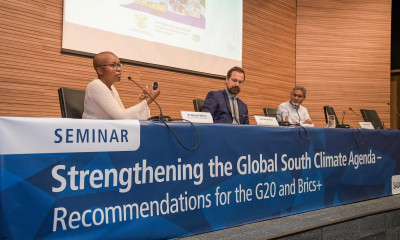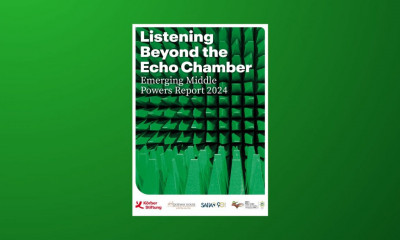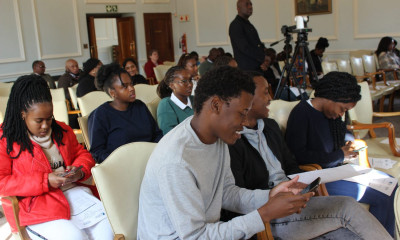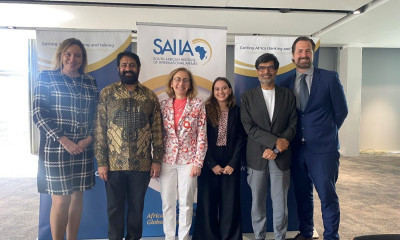In the wake of the global financial crisis and economic recession, the past year has been one of international consolidation and reconfiguration. An unprecedented meltdown was only prevented by judicious intervention by governments in the major financial capitals of the United States and Europe. Most notably, however, with the consultation and co-operation of key emerging powers. While we might never know how close we came to a global financial catastrophe, it is now increasingly apparent that the fulcrum of global financial power has taken a significant swing eastwards.
Moreover, these financial ruptures have both affirmed the role that the Bretton Woods institutions should play in global economic governance, as well as the imperative of their reform to reflect the changing world dynamics. The profound lesson drawn from the global financial crisis is the inability of the G7/8 to manage such turbulence on its own. The elevation of the G20 Finance Forum to leadership level in the wake of the financial crisis acknowledged this reality and ended the ‘foot-dragging’ that had characterised discussions on G8 expansion. South Africa’s position within the G20 thus presents the country with immense possibilities to make meaningful input in the reconfiguration of global economic governance.
As sobering as the demise of global financial orthodoxy has been, South Africa and its banking and financial system have emerged from the crisis in higher standing than before. This is particularly encouraging given the levels of debt and borrowing that the country faces over the medium term in order to meet its pressing and urgent developmental challenges.
Last year I noted that the global financial crisis presented a unique opportunity for Africa to use the crisis to galvanise action around the continent’s grave challenges. This should include continued commitment to the macro-economic reform agenda and vitally, domestic resource mobilisation for development. However, this does not absolve the developed world from meeting their various commitments to development – not only on aid, but also on the removal of trade and other barriers that hinder sustainable growth among poorer countries. Most importantly, Africa should not be excluded from the debates on reform of the international financial regulatory system. While South Africa is the sole African member of the G20 it is heartening that the Committee of Ten is developing input for the G20 on global financial matters with a direct bearing on the continent’s states.
Arguably the most significant global event of the past year was the Climate Change Summit held in Copenhagen, Denmark, in December 2009. The outcome the world had hoped for and needed was a legally-binding treaty on climate change. Despite the summit’s failure to do that, South Africa played a progressive and valuable bridge-building role grounded in an appreciation of the different dynamics at play and solid technical knowledge, in the adoption of the Copenhagen Accord. As a key member of the BASIC (Brazil, South Africa, India and China) group, South Africa was crucial in galvanising the formation and activities of the ‘commitment circle’ when negotiators failed to deliver a workable text for the Accord. Lauded by many, South Africa displayed the advantages a small but active country can bring to bear in multilateral fora, where more dominant actors are often too concerned with protecting their own narrow interests.
Copenhagen also concretised the new axis of power relations, highlighting that progressive co-operation among emerging powers on issues of global importance can move the process along, provided this new found power is coupled with a sense of global responsibility.
While on the global front South Africa earned many kudos, its attempts to achieve progress in its more immediate neighbourhood were more challenging. Despite some initial movement in the implementation of the Global Political Agreement struck in September 2008, many of the political problems still remain. The recent unilateral shuffling of ministerial cabinet posts has further undermined the legitimacy of and confidence in the government of national unity to the point where Prime Minister Morgan Tsvangirai has stated that talks between his MDC formation and ZANU-PF have broken down completely. Zimbabwe remains a key test of South Africa’s diplomacy and influence in the region. The successful resolution of the impasse and full implementation of the Global Political Agreement is made all the more urgent by the looming threat of yet another food crisis in Zimbabwe.
Zimbabwe reminds us too, that democratic transitions and consolidation in Africa are reversible. While the nascent governance architecture of the African Union (AU) matures and the African Peer Review Mechanism sets a welcome benchmark, the political trajectory of some African states remains worryingly unclear. Coups d’état, even those prosecuted under the guise of establishing a future democratic dispensation – as in Niger most recently – remain a threat to Africa’s development. It is important for both the credibility of the AU and the democratic consolidation of the continent, that such non-constitutional activity is condemned by Africa’s leadership, its perpetrators sanctioned and democracy restored without delay.
Moreover, while the era of ‘Big Man’ leadership and politics in Africa is no longer the norm, it is vital for the continent that credible political leadership fills the ‘Big Man’ vacuum. A cohort of reformist African leaders has in recent years gone quietly into retirement. This generation of African reformers should be replaced by a leadership cohort of democratic consolidators. Africa simply cannot afford further democratic reversals, nor indeed power vacuums, particularly in its pivotal states. The deteriorating situation in Nigeria (both in the Niger Delta and in the centre of the country between Muslims and Christians) is cause for great concern, as is the uncertainty around Kenya’s constitutional reforms and political stability.
The festering crises in the continent’s two biggest countries, Democratic Republic of Congo and Sudan, require internal political will, but equally decisive leadership from key continental leaders. In Sudan in particular, its upcoming elections and the 2011 referendum on South Sudan’s independence will test the continent’s commitment to the democratic process.
South African foreign policy and international relations
While unlike its predecessor the Zuma administration is less likely to be characterised as a foreign policy Presidency, a less high profile does not necessarily mean less effective foreign policy and international relations engagement. In some respects, it may offer the promise of progress and improvement. Indeed, to date, there have been a number of encouraging developments under the current administration, which reflect a sharper prioritisation of key bilateral relations, and attempts to develop a more coherent cooperation policy in Africa.
In this regard President Zuma’s selection of Angola as the country of his first state visit in August 2009 was a significant step in strengthening relations between the region’s two largest economies and regional powers, after a period of neglect. More than enhanced bilateral relations between South Africa and Angola however, regional security in the longer term also hinges to a degree on closer co-operation and indeed collaboration between the region’s two military powers, particularly in the destabilising environment of the DRC.
Equally, President Zuma’s visit to Brazil – an increasingly important global player, a key Southern partner and a country with growing commercial and political interest in Africa – pointed to the acceleration of our country’s South-South ties, the continuation of a trend but given new impetus by the global financial crisis. Nevertheless, the appropriate balance between South-South and North-South relations is essential for the successful conduct of South Africa’s international relations. Significantly, President Zuma’s state visit to the United Kingdom in March 2010, and the size and composition of the delegation was a measure of the importance placed on South Africa’s bilateral relations with its third largest trading partner. Trade and Industry Minister Rob Davies subsequently set the country the ambitious target of doubling its trade and investment with the UK in the next five years, based on enhanced exports of value-added product to the UK.
For a number of years South Africa’s development cooperation and post-conflict support has been growing on the continent. Thus the government’s decision to establish the South African Development Partnership Agency (SADPA) is a very positive step in streamlining its broad and varied assistance in Africa, and ensuring coherence and efficacy.
2010 is the year that the world comes to South Africa. The FIFA World Cup competition is the largest global sporting event by viewership. The hosting of the 2010 World Cup is a source of immense pride for our nation, but it is equally a high point for the African continent, which is increasingly the source of global sporting talent. Thus it is of paramount importance that in carrying a mandate for the African continent, South Africa hosts a tournament that resonates with the promise of “Yes we can”, but more importantly, concludes with the refrain, “Yes we did”! (It would be helpful if Bafana Bafana won a match or two in the process, of course.)
Ladies and gentlemen, it has taken the South African Institute of International Affairs 76 years to become an overnight success. The University of Pennsylvania’s annual global think-tank survey ranked SAIIA first in sub-Saharan Africa in 2009. This is a cause for celebration, pride and acknowledgement to all who have brought SAIIA to where it is today. Having established ourselves as primus inter pares, (first among equals), we now have a standard to maintain and indeed exceed in coming years. I have every confidence that in SAIIA today we have the team in place to do just this.






